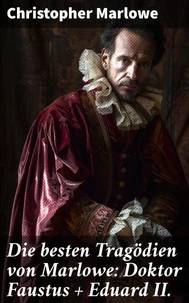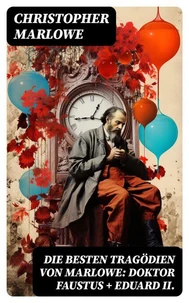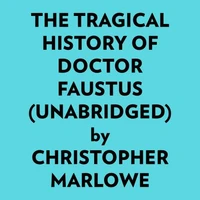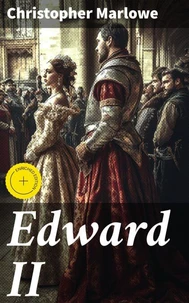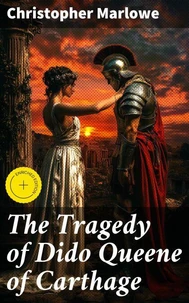The Tragical History of Doctor Faustus. From the Quarto of 1604
Par : ,Formats :
Disponible dans votre compte client Decitre ou Furet du Nord dès validation de votre commande. Le format ePub est :
- Compatible avec une lecture sur My Vivlio (smartphone, tablette, ordinateur)
- Compatible avec une lecture sur liseuses Vivlio
- Pour les liseuses autres que Vivlio, vous devez utiliser le logiciel Adobe Digital Edition. Non compatible avec la lecture sur les liseuses Kindle, Remarkable et Sony
 , qui est-ce ?
, qui est-ce ?Notre partenaire de plateforme de lecture numérique où vous retrouverez l'ensemble de vos ebooks gratuitement
Pour en savoir plus sur nos ebooks, consultez notre aide en ligne ici
- Nombre de pages52
- FormatePub
- ISBN859-65--4734907-5
- EAN8596547349075
- Date de parution15/09/2022
- Protection num.Digital Watermarking
- Taille393 Ko
- Infos supplémentairesepub
- ÉditeurDIGICAT
Résumé
Christopher Marlowe's 'The Tragical History of Doctor Faustus' is a volatile exploration of ambition, desire, and the human condition, wrapped in the rich literary fabric of the Elizabethan period. Written in blank verse, this tragic play delves into the life of Faustus, a scholar who, dissatisfied with the limits of human knowledge, makes a fateful pact with the devil, trading his soul for twenty-four years of magical powers.
Marlowe's use of soliloquies and rhetorical flourishes imbues the text with a heavy sense of foreboding, as it poses fundamental questions about morality, knowledge, and the consequences of hubris, reflecting the Renaissance's changing attitudes towards religion and individuality. Christopher Marlowe, a contemporary and possible rival of Shakespeare, was a figure shrouded in mystery and controversy.
His own life of excess and ambition, coupled with his scholarship in classical texts, greatly influenced his writing. Marlowe's relationship with the themes of rebellion and tragic heroism can be traced to his own tumultuous existence, marked by allegations of atheism and his brutal murder at a young age, suggesting that he was acutely aware of the fragile state of human ambition. Readers seeking a reflective and provocative engagement with the boundaries of knowledge and the supernatural will find 'Doctor Faustus' an essential text.
Its layered characterizations and moral complexities resonate profoundly with contemporary audiences, inviting them to ponder the eternal struggle between aspiration and consequence. This timeless tale encourages readers to examine their own desires in the shadow of moral reckoning.
Marlowe's use of soliloquies and rhetorical flourishes imbues the text with a heavy sense of foreboding, as it poses fundamental questions about morality, knowledge, and the consequences of hubris, reflecting the Renaissance's changing attitudes towards religion and individuality. Christopher Marlowe, a contemporary and possible rival of Shakespeare, was a figure shrouded in mystery and controversy.
His own life of excess and ambition, coupled with his scholarship in classical texts, greatly influenced his writing. Marlowe's relationship with the themes of rebellion and tragic heroism can be traced to his own tumultuous existence, marked by allegations of atheism and his brutal murder at a young age, suggesting that he was acutely aware of the fragile state of human ambition. Readers seeking a reflective and provocative engagement with the boundaries of knowledge and the supernatural will find 'Doctor Faustus' an essential text.
Its layered characterizations and moral complexities resonate profoundly with contemporary audiences, inviting them to ponder the eternal struggle between aspiration and consequence. This timeless tale encourages readers to examine their own desires in the shadow of moral reckoning.
Christopher Marlowe's 'The Tragical History of Doctor Faustus' is a volatile exploration of ambition, desire, and the human condition, wrapped in the rich literary fabric of the Elizabethan period. Written in blank verse, this tragic play delves into the life of Faustus, a scholar who, dissatisfied with the limits of human knowledge, makes a fateful pact with the devil, trading his soul for twenty-four years of magical powers.
Marlowe's use of soliloquies and rhetorical flourishes imbues the text with a heavy sense of foreboding, as it poses fundamental questions about morality, knowledge, and the consequences of hubris, reflecting the Renaissance's changing attitudes towards religion and individuality. Christopher Marlowe, a contemporary and possible rival of Shakespeare, was a figure shrouded in mystery and controversy.
His own life of excess and ambition, coupled with his scholarship in classical texts, greatly influenced his writing. Marlowe's relationship with the themes of rebellion and tragic heroism can be traced to his own tumultuous existence, marked by allegations of atheism and his brutal murder at a young age, suggesting that he was acutely aware of the fragile state of human ambition. Readers seeking a reflective and provocative engagement with the boundaries of knowledge and the supernatural will find 'Doctor Faustus' an essential text.
Its layered characterizations and moral complexities resonate profoundly with contemporary audiences, inviting them to ponder the eternal struggle between aspiration and consequence. This timeless tale encourages readers to examine their own desires in the shadow of moral reckoning.
Marlowe's use of soliloquies and rhetorical flourishes imbues the text with a heavy sense of foreboding, as it poses fundamental questions about morality, knowledge, and the consequences of hubris, reflecting the Renaissance's changing attitudes towards religion and individuality. Christopher Marlowe, a contemporary and possible rival of Shakespeare, was a figure shrouded in mystery and controversy.
His own life of excess and ambition, coupled with his scholarship in classical texts, greatly influenced his writing. Marlowe's relationship with the themes of rebellion and tragic heroism can be traced to his own tumultuous existence, marked by allegations of atheism and his brutal murder at a young age, suggesting that he was acutely aware of the fragile state of human ambition. Readers seeking a reflective and provocative engagement with the boundaries of knowledge and the supernatural will find 'Doctor Faustus' an essential text.
Its layered characterizations and moral complexities resonate profoundly with contemporary audiences, inviting them to ponder the eternal struggle between aspiration and consequence. This timeless tale encourages readers to examine their own desires in the shadow of moral reckoning.


